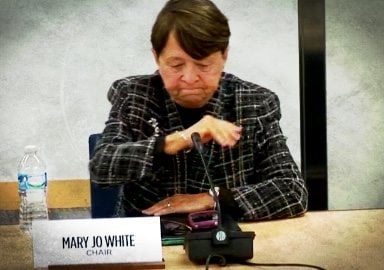The team at Engine, under the leadership of Evan Engstrom, Policy Director of the group, has crafted a must-read document on what needs to be fixed to address the shortcomings of Title III, equity crowdfunding. While both Reg A+ (Title IV) and accredited crowdfunding (Title II) are now actionable, the final securities exemption legalized under the JOBS Act of 2012, Title III crowdfunding, remains in rulemaking limbo. This unfortunate event occurred, in part, because of the hurdles intrinsic to rules prescribed by Congress. Engine has created a thoughtful, logical approach to guide in engendering a vibrant investment crowdfunding ecosystem. Unlike too many other opinions in the past, Engine has referenced empirical evidence experienced from the most effective crowdfunding ecosystem that operates today in the UK.
“Enabling investment crowdfunding for all investors is critical for expanding capital access to emerging entrepreneurs and startups across the country. Raising capital is often the greatest challenge an entrepreneur faces when getting his or her business off the ground, and too many potential business leaders are left behind because they lack adequate personal finances or can’t tap into sources of angel financing or venture capital. Because investment crowdfunding will allow millions of new people to easily provide capital to startups, it has the unique potential to drive much-needed capital to underrepresented groups of entrepreneurs.”
“It’s with these entrepreneurs in mind that we believe more work remains to be done to perfect the investment crowdfunding regime.”
Investment crowdfunding should not be encumbered by partisan bickering. The need to foster an environment where access to capital is streamlined for entrepreneurs, and investment opportunity is democratized for the masses, just makes sense. This is how jobs are created and wealth achieved. Policy makers have been woefully misguided in rules intended to protect consumers that actually add risk to the equation.
Must Read
The white paper by Engine, embedded below, should be required reading for SEC Commissioners, CorpFin, and elected officials on Capitol Hill.
In brief this is what must be done; 
- Reduce disclosure requirements
Existing crowdfunding markets in the U.S. and U.K. have proven resistant to fraud and abuse, even under a lighter touch regulatory framework. Current statutory disclosure obligations are overly burdensome and their costs are not proportionate to the investor protections they may provide. - Increase aggregate funding limits
The fundraising limits established by the JOBS Act do not appear to reflect startups’ actual capital needs. New evidence from markets in the U.S. and U.K. suggests that the current statutory cap of $1 million is too low and will exclude a large swath of potential issuers. - Explicitly authorize intermediaries to curate and provide information about issuers
The SEC has interpreted the JOBS Act to prohibit funding portals from curating offers by subjectively deciding which issuers can seek funds through their sites. Developments in similar U.S. and U.K. markets show that this approach is misguided and would bar portals from providing an additional level of screening that could better protect investors. - Allow entities other than companies to raise funds
Innovative special purpose vehicles such as venture funds are not eligible for the crowdfunding exemption under Title III, though similar crowdfunded venture funds have already developed in the U.K. These sorts of investment vehicles could help non-accredited investors better diversify their portfolios and could consequently make investment crowdfunding safer and more profitable for investors.  Allow portals to take equity stake in companies
Allow portals to take equity stake in companies
Allowing portals to take equity stakes in issuer companies will help make it more economically viable for portals to list the seed-stage companies that would likely benefit most from expanded capital access. To discourage unscrupulous behavior, this allowance should be coupled with robust financial interest disclosure requirements.- Include a “testing the waters” provision
Existing markets in the U.S. and U.K. have shown that about two-thirds of crowdfunding campaigns fail to reach their funding goals. Issuers should be permitted to communicate with potential investors to gauge interest before incurring burdensome filing and preparation costs. - Modify investor limits
Evidence from the U.K. crowdfunding market suggests that caps on non-accredited investor participation are unnecessary and overly restrictive. Hard caps included in the JOBS Act will prevent sophisticated, experienced investors that nevertheless fall short of the SEC’s accredited investor thresholds from participating in investment crowdfunding to the extent that they would like. The overly burdensome disclosure and auditing requirements could do more harm than good for investor protection;
 The proposed rules as outlined harm the retail investor. Saddled with excessive cost and lack of curation means that quality issuers “go immediately to accredited investor platforms” (as they will be more efficient and versatile), “leaving non-accredited investors to choose amongst lower-quality, higher-risk options”. The data today indicates that the “lack of government-mandated disclosures for crowdfunding issuers in the U.K. has not led to any increased fraud or other investor harm”.
The proposed rules as outlined harm the retail investor. Saddled with excessive cost and lack of curation means that quality issuers “go immediately to accredited investor platforms” (as they will be more efficient and versatile), “leaving non-accredited investors to choose amongst lower-quality, higher-risk options”. The data today indicates that the “lack of government-mandated disclosures for crowdfunding issuers in the U.K. has not led to any increased fraud or other investor harm”.
Investment crowdfunding portals have a profound financial interest in ensuring that users have access to information sufficient to make them comfortable investing in the companies listed on the portal while keeping disclosure/due diligence costs low enough for issuers to attract high-quality companies to their sites. Instead of forcing issuers to spend money creating financial statements that are of limited utility to retail investors trying to determine whether a startup company’s future growth potential is sufficient to merit investment, portals should limit issuer disclosures to the information that investors actually find helpful. Items like the company’s projected growth strategy and the quality and credibility of its management team. Because in the end, it is the investor who pays for such disclosure.
 The UK investment crowdfunding market allows all investors to participate, regardless of income or net worth. The definition of an accredited investor in the US is non-sensical and has disenfranchised a generation of investors thus exacerbating the wealth gap. Using a rule that defines sophistication based on a balance in a bank account, versus knowledge and skill, should have been tossed out long ago. Perhaps the most glaring example of the fallacy of this approach is the fact that a former SEC Commissioner was not accredited for most of his tenure.
The UK investment crowdfunding market allows all investors to participate, regardless of income or net worth. The definition of an accredited investor in the US is non-sensical and has disenfranchised a generation of investors thus exacerbating the wealth gap. Using a rule that defines sophistication based on a balance in a bank account, versus knowledge and skill, should have been tossed out long ago. Perhaps the most glaring example of the fallacy of this approach is the fact that a former SEC Commissioner was not accredited for most of his tenure.
As Engine outlines, the UK has made bold policy decisions from which we may benefit. It serves as perhaps the best indicator of what Title III crowdfunding could look like in the US— if elected and appointed officials adopt a similar regulatory regime.
Leadership…
This is about jobs, equal opportunity and a more robust economy. This is something that both Democrat and Republican should support – without hesitation. With final rules for Title III expected later this month the pressing question for the moment is: Can policymakers do the right thing and get it done?
Read the Engine White paper embedded below.
[scribd id=285400769 key=key-ZhpFmCIANqiPpsrR9iMy mode=scroll]



